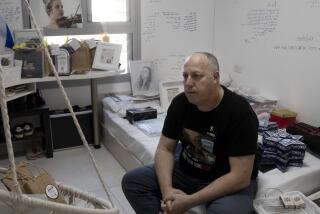The Red Fades From a Russian Holiday
- Share via
MOSCOW — There were bigger crowds at the McDonald’s in Pushkin Square on Friday than at a Communist Party rally in the shadow of the Kremlin to remember an event 80 years ago that changed the world.
Against slate-gray skies and snowy sidewalks, there was more red from discarded French fry containers, billboards pushing Revlon lipstick and neon lights luring nouveaux riches to glitzy casinos than from the flags and banners waved in celebration of Revolution Day.
On what was once a vaunted patriotic holiday commemorating the 1917 Bolshevik Revolution, it might be said that the ideology for which the fire went out among Russians nearly a decade ago was practically extinguished on its 80th birthday.
This first year of observing Nov. 7 as the Day of Reconciliation and Accord--instead of Revolution Day--passed like the merciful death of a long-suffering patient among a population satisfied enough that it was still a day off from work, as was President Boris N. Yeltsin’s intention.
A year ago, after a similarly unremarkable turnout for the anniversary, Yeltsin proclaimed a change from paying tribute to a political watershed no longer recalled with favor by most to a holiday dedicated to healing the divisions that run deeply through the new Russia.
“The truth about the sacrifices and sufferings of millions of our countrymen, the grief and trouble which the revolution brought, was too bitter,” Yeltsin told the nation in a televised address Friday. “The revolution provoked conflict in society, made Russians clash in a fratricidal civil war, sacrificed ordinary human values to political fanaticism, tore us from the world community for a long time and made a boogeyman for other peoples and countries.”
The 66-year-old president, himself once a high-ranking member of the Communist Party, ordered a monument built to commemorate all Russians killed, both the Bolshevik “Reds” and the Imperialist “Whites,” during the revolution and the four years of bloody upheaval that followed.
“Today, we simply must remember everyone who died in the civil conflict, and understand and forgive those who made a fatal historical mistake by placing a utopian ideal above human life,” Yeltsin said.
But the rewards of Russia’s evolving democracy and market economy have remained elusive for many in this country, especially the elderly.
On Friday, nostalgia for the Soviet era prompted the most disenchanted to take to the streets.
A crowd of about 3,000 pensioners and leftist radicals gathered at this capital’s last prominent monument to Soviet founder V. I. Lenin and marched to Red Square for fiery oratory in a frozen drizzle that kept away others who might have listened.
Denouncing Yeltsin’s attempt to hijack his aging followers’ most cherished holiday, Communist Party leader Gennady A. Zyuganov declared that there cannot be peace or accord among Russians as long as social inequities persist.
“Millions of homeless children, unemployed and refugees will not agree to such peace,” said the man whose challenge and message were defeated by Yeltsin in last year’s presidential election.
Another pro-Communist agitator, Gen. Lev Rokhlin, a decorated hero of the Afghan War, appealed to the demonstrators “to overturn the hateful regime, and the sooner the better.”
Across Russia, fervor for the revolution was uniformly weak.
The Interior Ministry, which deployed 400,000 police and riot troops to guard against clashes over the three-day weekend, reported a nationwide turnout for peaceful rallies and marches of no more than 200,000.
The other 147 million Russians spent the day at home with friends or family, or gathered around the stoves and fireplaces of their country dachas.
Yeltsin had called on his fellow Russians to steer clear of angry rallies to avoid confrontation, and most heeded that appeal.
A poll by the Public Opinion Foundation showed 95% of respondents intended to observe the holiday as a nonpolitical day off.
But the president’s abolition of Revolution Day was met with some dissatisfaction: The same poll had 47% describing Nov. 7 as an important date commemorating Russia’s past glory.
“This was such a Communist thing to do--unilaterally taking away a holiday that meant something to a certain part of the population,” complained pensioner Yevgenia Skripko, a onetime Yeltsin supporter who now describes herself as thoroughly apathetic.
The daily Moskovskaya Pravda condemned the president for “trying to snatch the monopoly on the once-Red holiday out of the hands of the Red opposition.”
At Friday’s rally, Zyuganov proclaimed a bright future in the 21st century for his party and its vision of a worldwide workers’ paradise. But his words echoed emptily across the otherwise abandoned Red Square. The event contrasted dramatically with the full-bore celebration at the 70th anniversary a decade ago, when the might of the Soviet Red Army was paraded before hundreds of thousands for the world to see and shudder.
More to Read
Sign up for Essential California
The most important California stories and recommendations in your inbox every morning.
You may occasionally receive promotional content from the Los Angeles Times.











